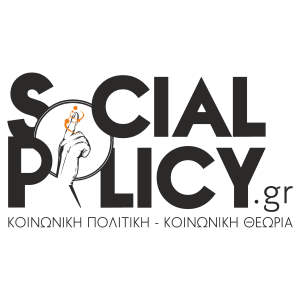Βραβείο 2021

Βραβείο 2022

Στρατηγικός συνεργάτης

Υποστηρικτές Επικοινωνίας


Open access article: https://link.springer.com/article/10.1186/s13229-026-00706-3?utm_source=researchgate.net&utm_medium=article#citeas
Abstract
Background
Despite rising rates of autism prevalence, there remains a pressing need to enhance the quality of life for autistic people in Europe and around the world.
Methods
We conducted the 10 Points for Change survey to identify the 10 most important areas that require improvement for autistic people across the region. Data from 1,709 autistic people, parents/carers and members of autism-related organisations residing within the European Union (EU) and the United Kingdom (UK) were analysed, together with autism-related differences (autistic vs. non-autistic; formal vs. no formal autism diagnosis) and gender differences (male vs. female) in results.
Results
Across groups, areas that require the most urgent changes are education, public awareness and understanding of autism, employment, and government funding for autism-specific services. Differences in results between groups reflect their specific needs and experiences. Discrimination is a crucial area for change according to autistic people with formal diagnosis of autism, whereas autistic people without formal diagnosis indicate diagnostic services as a priority for change. According to parents/carers and members of autism-related organisations, changes are also needed to improve social inclusion of autistic people. Other areas of priority for change across all groups include mental healthcare (within top 10 for autistic participants and parents/carers), support with daily living, and post-diagnostic services (the latter two within top 10 for parents/carers and members of autism-related organisations). For some areas, their identification and importance as priorities for change significantly varied with whether participants were autistic or formally diagnosed and autistic participants’ gender. Comparisons across countries with the greatest representation in the survey – Germany, the UK, France, Spain and Poland – revealed consistent priorities.
Citation: Binte Mohd Ikhsan, S., Holt, R., Ruigrok, A. et al. Priorities for change for autistic people across Europe. Molecular Autism 17, 12 (2026). https://doi.org/10.1186/s13229-026-00706-3
Open access article: https://journals.sagepub.com/doi/10.1177/13623613231168444?utm_source=researchgate.net&utm_medium=article
Abstract
Barriers to healthcare experienced by Australian autistic adults have not been previously explored. We conducted a cross-sectional investigation of barriers to healthcare and associated factors from a subtle realism perspective. Perceived barriers to healthcare were obtained from the Barriers to Healthcare Checklist Short-Form (BHC). A total of 263 autistic and 70 non-autistic individuals completed the BHC. On average, autistic adults reported more barriers to healthcare (4.58) than non-autistic adults (0.76). Gender diversity, higher levels of generalised anxiety, greater global disability and less satisfaction with social support contributed to the experience of barriers to healthcare in autistic participants in regression modelling. Australian autistic adults face substantial barriers to healthcare. Understanding these barriers provides an opportunity to develop approaches to improve access; such as co-designing a healthcare access roadmap for autistic adults, with co-designed policies and practices which advocate for the needs of autistic adults.
Citation: Arnold, S. R., Bruce, G., Weise, J., Mills, C. J., Trollor, J. N., & Coxon, K. (2023). Barriers to healthcare for Australian autistic adults. Autism, 28(2), 301-315. https://doi.org/10.1177/13623613231168444 (Original work published 2024)
Open access article: https://journals.sagepub.com/doi/full/10.1177/13623613231168444
Abstract
Barriers to healthcare experienced by Australian autistic adults have not been previously explored. We conducted across-sectional investigation of barriers to healthcare and associated factors from a subtle realism perspective. Perceivedbarriers to healthcare were obtained from the Barriers to Healthcare Checklist Short-Form (BHC). A total of 263 autisticand 70 non-autistic individuals completed the BHC. On average, autistic adults reported more barriers to healthcare(4.58) than non-autistic adults (0.76). Gender diversity, higher levels of generalised anxiety, greater global disability andless satisfaction with social support contributed to the experience of barriers to healthcare in autistic participants inregression modelling. Australian autistic adults face substantial barriers to healthcare. Understanding these barriersprovides an opportunity to develop approaches to improve access; such as co-designing a healthcare access roadmap forautistic adults, with co-designed policies and practices which advocate for the needs of autistic adults.
Citation: Arnold, S. R., Bruce, G., Weise, J., Mills, C. J., Trollor, J. N., & Coxon, K. (2023). Barriers to healthcare for Australian autistic adults. Autism, 28(2), 301-315. https://doi.org/10.1177/13623613231168444 (Original work published 2024)
Open access article: https://www.tandfonline.com/doi/epdf/10.2147/NDT.S461650%4010.1080/tfocoll.2024.0.issue-Autism_disorder?needAccess=true
Abstract
This review is of interest to researchers, policymakers, and healthcare professionals working in the field of autism inAfrica. The review aims to describe autism in sub-Saharan Africa, focusing on South Africa and Nigeria regarding prevalence,incidence, identification, treatment, and attitudes towards autistic children. There are several challenges, such as lack of awareness,limited access to professional support and diagnostic tools, and cultural considerations in establishing the autism prevalence in theAfrican region compared to other parts of the world. Additionally, South Africans and Nigerians exhibit diverse perspectives andattitudes that significantly influence the provision of treatment, including stigma and misconceptions held by healthcare professionalsthemselves. As a result, it is difficult to determine prevalence in South Africa and Nigeria. However, research has indicated that autismprevalence is rising globally, and in these contexts. Rising prevalence highlights the need to increase access to services, rehabilitation,and provide support to families of children with autism. Furthermore, research has emphasized the inequitable support and accessavailable to families living in low-and high-income households and the need to provide contextually relevant and responsiveinterventions, education and training, research and policy in these countries.
Citation: Adams S.N., (2024). The Unmasking of Autism in South Africa and Nigeria, Autism, the Disorder without Borders and Geopolitical Variations, (0): 947-955.
Abstract
The purpose of this study is to highlight the need to develop and expand specialized support for people with ASD, examining the effect of these services on their families' quality of life. Despite efforts to promote diversity and equal opportunities for people with disabilities, Cyprus faces challenges in various levels such as in society, education, and employment. Unlike other countries, there is limited literature and data on adults with ASD in Cyprus, which prevents from forming an accurate assessment of their needs and the impact on their quality of life. Further, as a European Union Member State, Cyprus has restrictions on specialized programs and benefits, which makes it difficult to fully implement the UN Convention on the Rights of Persons with Disabilities (CRPD). This led to a lack of effective support services for adults with ASD and their families. Consequently, parents express concerns about the support that will be available for their adult children in the future. This study uses qualitative data obtained through the constant comparative method and is part of a larger project that includes both quantitative and qualitative research methods. The study presents important issues such as the positive impact of services on these adults and their families, families' concerns about specialized support and programs for people with ASD, and their relationships with their parents. The results are expected to raise awareness, promote social policy development, and improve the quality of life of people with ASD and their families in Cyprus.
Citation: Georgiou, I. and Parlalis, S.K. (2024), "Social Services and Support Structures for Adults With Autism Spectrum Disorder (ASD) and Their Parents' Quality of Life in Cyprus", Ciciurkaite, G. and Brown, R.L. (Ed.) Disability and the Changing Contexts of Family and Personal Relationships (Research in Social Science and Disability, Vol. 15), Emerald Publishing Limited, Leeds, pp. 103-120. https://doi.org/10.1108/S1479-354720240000015008